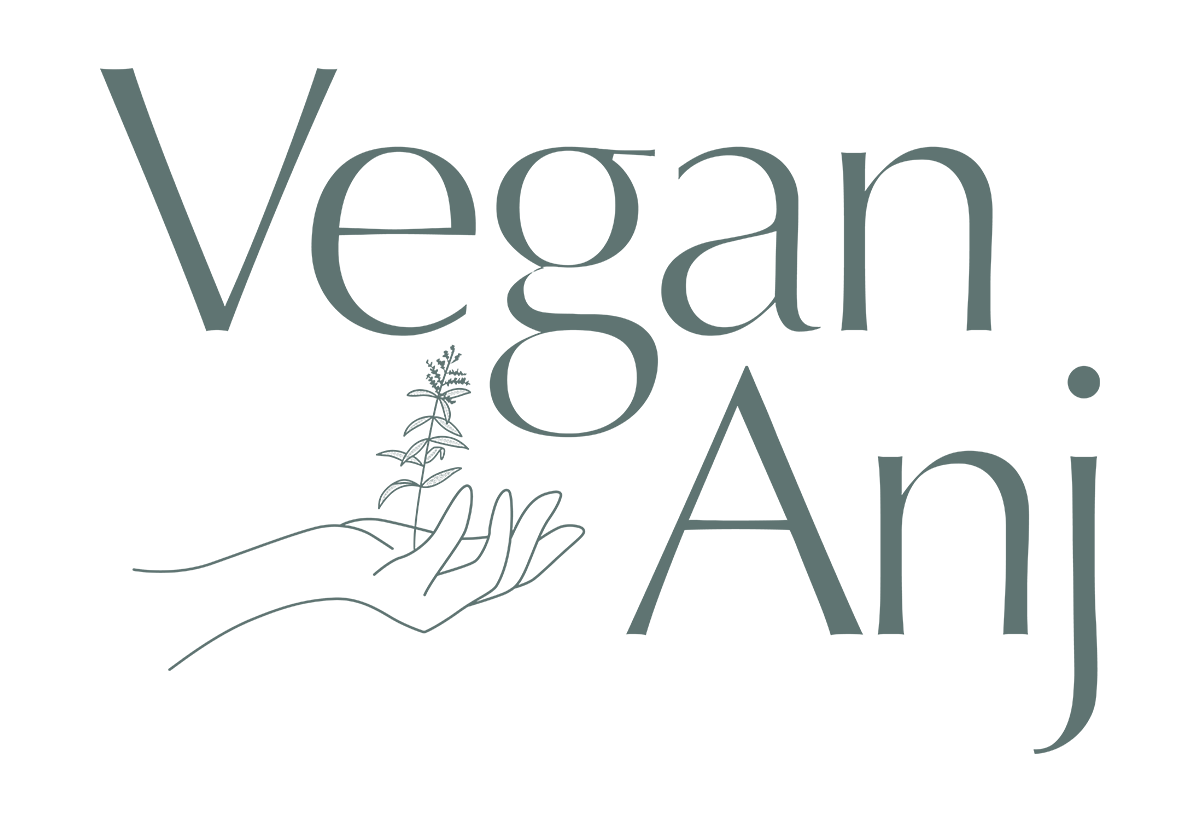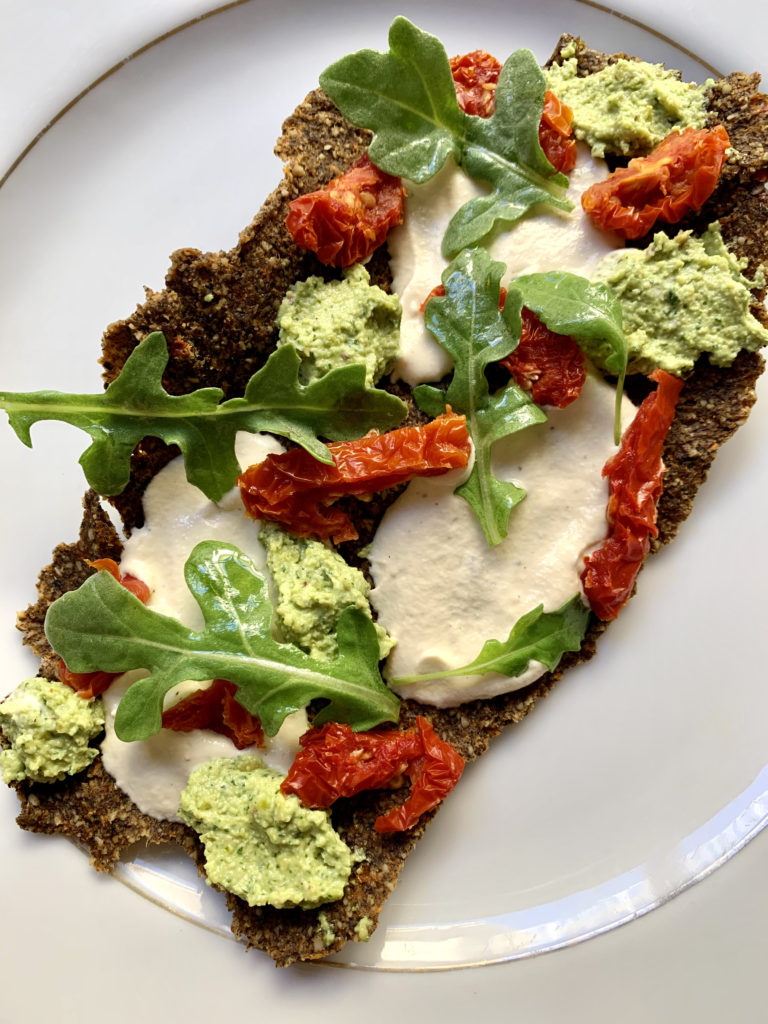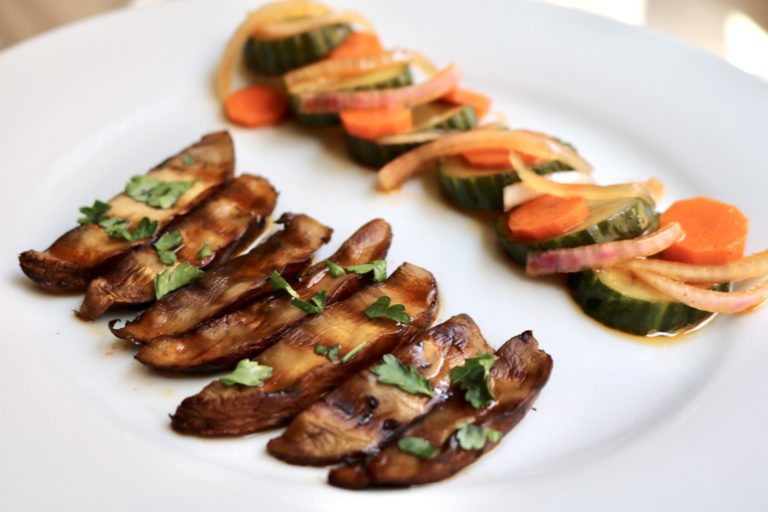WHY I CHOSE – AND STOPPED – THE FFI ONLINE COURSE (UPDATED, HONEST REVIEW)
Hi, friends! If you’ve followed along on my journey so far, thank you. If you’re new to my blog, welcome! I wanted to take a moment to share some updates about what I thought would be the best vegan cooking course for me: Future Food Institute. As it turns out, I was wrong – but the experience has served as an important re-evaluation of my priorities, while crystallizing how I can better use my time and energy in ways that serve me and what I care about most: sharing the beauty (and ease) of plant-based eating and living.
With that, I’ve decided to stop the timed component of the course and forgo the FFI certification. I spoke with FFI’s supervising chef about this decision, who was very gracious in letting me know that my feedback about the course was taken seriously and in earnest.
I’ll now share my experience with you all in the spirit of honesty, and also with the perspective that – as with everything in life – there were both positives and negatives to this experience; but for me, personally, the latter was outweighing the former when it came to FFI. And while this wasn’t the best vegan cooking course for me, it doesn’t mean that there are plenty of people who have taken and loved the course (and will continue to do so).
It’s my hope that others who are trying to find the best vegan cooking course for their unique goals have all of the information to make an informed decision for themselves. I’m keeping my original post below for context, so you can see my initial experience and thoughts contrasted with where I ultimately landed with the FFI cooking course.
THE TL;DR
My honest take is that this course is best suited for people who are:
a) Professional chefs
b) People who want to become professional chefs
c) People who do not work full-time (expect to spend 15+ hours on this course per week, including planning time, plus ingredient/equipment shopping time)
As much as I love gorgeous, fancy food, my objective is to share with others how attainable and fun plant-based cooking and eating is. I found this course to be neither of those things, overall. I had my moments of fun, but unfortunately, the enjoyable parts became heavily outweighed by constant feelings of stress and frustration.
That being said, if you are in any of the above situations, then it’s possible you’ll have a very different experience than I did – because there is plenty of good in this course, which I’ll touch on first:
THE PROS
- Interesting, dynamic, and challenging recipes. Though complex, there’s no arguing that the FFI lessons are beautiful, as is the resulting food. And, you get to make recipes used in Matthew Kenney’s restaurants, which is very cool.
- Live feed + easy connection with other course participants. I’m really grateful for the handful of connections I made through FFI. The platform enables you to view other students’ profiles and course work, and through the live feed you can engage with other students in real-time. I also made a handful of Instagram friends through FFI and it was fun to keep in touch with them, talk about the course, and vegan food, in general.
- Live chat feature (with one con). If you have a question about a particular lesson or recipe, you’re able to message the FFI chefs through the live chat feature and receive a reply within a few minutes. However, this is only available Monday-Friday 10am-6pm PST, which makes it difficult to get support if you work during those hours and reserve course time for weekends or evenings.
THE CONS
- Misrepresentation of skill level required. At the time I enrolled in FFI, the website indicated that “students from all walks of life, all at different culinary skill levels ranging from beginner to advanced.” I quickly learned that this course is in no way for beginners, and although I knew the course would be covering advanced techniques, I was led to believe that there would be extensive breakdowns that helped people learn them, and that just wasn’t the case. I strongly feel that this course is for people who are already advanced cooks, or professional chefs, or have unlimited time to go through lessons over and over (and likely spend time watching YouTube videos to fill in the many gaps within FFI’s lessons).
- Misrepresentation of time required. After timing the hours the lessons actually took me from start to finish, as well as the time I spent acquiring obscure ingredents and kitchen tools for each lesson, I determined it would take me close to 15 hours per week (minimum) in order to come even close to completing the course in one year, which is required to receive the certification. This is obviously a huge stretch for people that work full-time. The time required for each lesson was never under two hours, and on most occasions each lesson took several hours or even days. For example, I had to take two days off of work in order to complete the cheese module; it goes without saying that the average person cannot commit nearly a week of their life to making cheese.
- Misrepresentation of tools and ingredients required. Because FFI’s website only indicated that “a sharp knife, a cutting board, and a high-speed blender” was required and that you have to actually purchase the course to see the full equipment list, I was led to believe that I wouldn’t need to purchase much else, when in fact I spent over $1000 dollars acquiring professional-level equipment that most “home cooks and foodies” are unlikely to own: restaurant-grade dehydrators, ice cream makers, and smoking guns are not items that people typically have lying around. There was also no indication on the website of the amount of extremely specialized and expensive ingredients that people will have to purchase for each lesson; items like shaved truffles, maqui berry, cardamom pods, and red beet powder are quite costly and again, most people do not have these items stocked in their kitchen, and they are often difficult to find at average supermarkets. All of this ingredient and tool acquiring adds even more to the time and financial obligation, which is, again, not communicated on the website.
- Wastefulness surrounding food, student time, and money. I also felt that there was a certain carelessness and wastefulness that was prevalent in the course – from telling us we needed to buy $40 dollars worth of raw nuts for the cheese course, only to discover I needed half of those and the remaining nuts had to be thrown out (luckily I have a compost pickup service, but the majority of people do not). This pattern of waste seems contrary to the FFI ethos of sustainability. And, the way in which the majority of the lessons were structured made it incredibly difficult to manage expectations around the time needed to complete each lesson – again, people that work full-time need a better idea of how much time each lesson is going to take them. Unfortunately, there were also rampant inconsistencies and errors throughout most lessons – from measurement contradictions to extreme lack of clarity in instructions.
- Lack of consideration and empathy. On a final, and more personal note, is an issue I had with FFI regarding my extension request following the death of a loved one. As some of you know, I lost my stepdad, Robert, to cancer last May – about a month after I enrolled in the FFI course. I obviously had to take time off from work in the weeks leading up to and following his passing, as I was caretaking for him and supporting my mother. By the time I started getting back into work and FFI, it became apparent how time-intensive this course was, and I reached out to FFI to request a one month extension so I could try to meet the one year completion timeline to receive the certification. The response I received was less than considerate, and completely disregarded the reason that I was requesting an extension in the first place. I received no condolences or empathy. Instead, the response I received was insensitive, curt, and dismissive, and it read, “We ask that you write out with your request closer to your end date. Based on the progress we’ve seen for other students, even those who start and stop, we estimate it takes about 8 months to complete the course. Chances are you won’t need the full year to reach your culmination.” It was extremely disheartening for them to not even acknowledge my (very thoughtful) email about the request (and extremely valid reason for requesting the extension, in the first place) and comparing me to “other students” that have stopped and started. I felt invalidated and unsupported moving forward with the course, and by not allowing an extension at that point in time, it added further stress to my plate in having to play unrealistic catch up after just going through a major loss, all while trying to catch up on my professional work; it was just not possible for me to work on FFI that many hours per week (a time commitment that was never made clear in the first place).
With all of that being said, I received an extremely thoughtful response to my email expressing the above concerns and disappointments with my course experience. The supervising chef replied, and ultimately expressed her regrets that I hadn’t been treated with empathy regarding the extension, and that my overall experience had been less than ideal. And, she shared that they had taken my feedback seriously and were planning on adding the full equipment list to the FAQ section of the Foundations website, clarifying the language about the level of commitment the Foundations course demands, and adding the policy on extensions to the FAQ section of the course. She also said that they plan to conduct a “thorough review of the lessons” to correct any inconsistencies or errors in the content. Finally, she honored my refund request of the FFI course fee, and even unlocked the remainder of the course lessons (you can only see each lesson as you sequentially complete them). This way, I have the option of going through lessons at my own pace and selecting any that I’m particularly interested in at a given time.
Thanks to the supervising chef’s response, I feel much more at peace with the situation and am extremely grateful that I can move forward knowing that I was treated with respect in the end, and feel confident in continuing to support the Matthew Kenney brand and restaurants that I’ve come to love.
At the end of the day, I was never hoping to become a professional chef for a restaurant – I just wanted to learn new skills and find inspiration in a new format. While this wasn’t the right course for me to do that, I did learn a lot through the journey, though it was imperfect.
A final note on FFI Home
I am aware that the FFI Home course is self-paced and supposedly less advanced. However, this course was not available or advertised at the time I enrolled in Foundations, so it was not an option to me at that time. Unfortunately, though, given the misrepresentation of the Foundations course, I’d be remiss not to say I am a bit weary of the attainability of the Home course, given the way in which Foundations is portrayed as an everyman course, as well.
INITIAL POST – JULY 20, 2021
Why did I choose Food Future Institute’s 120-lesson, year-long vegan cooking course to begin my culinary journey?
I could have easily continued creating my own dishes from my fairly limited repertoire, or pulling recipes from the many, many vegan food blogs out there and adapting them on my own. And though I deeply appreciate the time and energy all of those blogs put in and the inspiration they’ve provided me, I knew I wanted more extensive training to really be able to master the art (and science) of plant-based cooking and establish a foundation of skills and knowledge that I could take with me for the rest of my life – and FFI seemed like the best vegan cooking course to me get there.
CHOOSING THE BEST VEGAN COOKING COURSE (WHAT THE DECISION CAME DOWN TO)
There are many a vegan cooking course out there — with Rouxbe and Forks Over Knives coming in at a close second and third place, respectively. While I may still end up taking those courses at some point, Food Future Institute (FFI) Foundations simply felt the most in alignment with my goals at the moment — mastering knife skills and more advanced cooking techniques, engaging with and receiving in-depth feedback from plant-based chefs each step of the way, and learning every facet of what makes for a beautiful, dynamic, and nutritious plant-based diet.
Extremely lofty goals, yes, but when I think about food and the essential role it plays in our lives there’s little that feels more integral and essential to us individually and collectively — planet included. I also feel that FFI’s mission was most closely in alignment with my own “why,” which is the driving force behind this blog.
The FFI course virtually covers virtually every facet of plant-based cooking. They’ve broken down the course into 18 ‘modules,’ which I’ve listed below.
FFI FOUNDATIONS COURSE SECTIONS
- Module 1: Kitchen Foundations + Knife Skills
- Module 2: Fundamentals of Raw Cuisine
- Module 3: Fermentation
- Module 4: Pantry, Freezer + Blends
- Module 5: Fromagerie
- Module 6: Salads + Dressings
- Module 7: The Humble Potato
- Module 8: Rice + Grains + Pulses
- Module 9: Shallow Fry
- Module 10: Center of Plate
- Module 11: Encapsulated Foods
- Module 12: Pizza
- Module 13: Flour + Water
- Module 14: Comfort Foods
- Module 15: Breakfast + Brunch
- Module 16: Yeasted Breads
- Module 17: Sweet Finale
- Module 18: The Final Presentation
Within each module, there are anywhere from 5-10 lessons and with each lesson completed, I upload a photo and brief write-up of my experience. If I have any questions or challenges I came across, I can ask the chefs (who also give me feedback after each lesson I’ve completed).
FFI COURSE BENEFITS
Another great feature is the live feed, where fellow students’ completed work is published in real-time. You can like and comment on their dishes, and also look to them for inspiration and first-hand experience on recipes you’re about to start on. This collaborative, community component was a major selling point for me.
The resources are also incredible. There are grocery lists, conversion charts, substitution lists, and equipment lists — it’s essentially a knowledge and resource library for every step of the journey.
All of this really justifies the $350 price point — and when you take into account the many features, it’s actually an incredible value for an online vegan cooking course.
If you have any questions about the course, drop me a line in the comments section below!









Hi. How were you able to contact FFI? I had a similar experience and am trying to contact them but none of the emails work.
Hi Stephanie, I’m sorry to hear you had a similar experience. I just emailed you – best of luck!
Hi, I took the course foundation and liked the recipes. Now I’m trying to get the recipes but I can not find the website. Can you?
Hi Lucy, it appears they took down the website (without notifying any students). Very unfortunate – but check out “Former Future Food Students” Facebook group, I believe they kept the recipes!
Thanks Anjelica! Good luck with your beautiful blog.
I also need to know how I can access the FFI recipes that I thought I would always have access to. Pedalhard@comcast.net
Do you have the rest of the modules that you can share?
Hi Doug, unfortunately I do not personally have them, but go to the “Former Future Food Students” Facebook group – they have them there!
Have you made any recipes from Practically Raw
I haven’t, but have made a note to check it out! Thanks for the tip, Gauri.